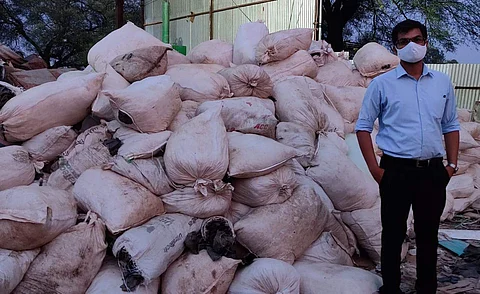

The main idea behind planting saplings is to save the environment. But what if we are polluting it again by using huge plastic bags in nurseries to grow these saplings. This was the question that struck Anupam Sharma. Currently, Anupam is an IFS officer in the Madhya Pradesh cadre, posted in the Maihar region. He says, "Our forest department plants crores of saplings every year at plantation sites. Recently, around 2.7 crore polypot saplings have been planted across Madhya Pradesh including 4.5 lakh saplings in Maihar alone. Once we take these saplings out of these plastic bags and plant them in the soil, the plastic waste remains and will naturally end up in landfills."
This plastic ends up polluting the soil for many years, as it won't degrade for years on end. "During an inspection, I found lots of plastic bags lying around at the plantation sites. I felt it was time to educate people about the impact of using plastic and throwing it all around instead of disposing it off in an eco-friendly manner. We collected kilos and kilos of plastic bags from the site and pledged not to use these plastic bags again, thus finally making these sites plastic-free plantation ones," explains this IFS officer from the 2018 batch.
Another big issue was disposing the ones that he had collected so far. He says, "My department and I approached a lot of cement factories around Madhya Pradesh to recycle and use this plastic in their production. They rejected the offer for many reasons. Then, we contacted a scrap dealer who agreed to buy out plastic waste at Rs 12 per kg. We had collected around 4,900 kgs of plastic waste and we were able to get Rs 59,000 from these scrap dealers."
Anupam and his wife thought of using it for the benefit of the villagers and designed a plan to invest this money. The officer explains. "My wife suggested that we invest that money in establishing a bio-methanation plant to use the waste generated from a local temple and turn it into biogas. This was later supplied to an old age home so that they can save the money spent on LPG. Beoynd that, they also bought a oil compressing machine for women in the village. The machine can be used to extract oil from seeds like ground nut, mustard seeds, soybean and a lot more. Then, he also bought a masala grinder that can be used to grind seeds and turn it into a powder."
Besides these machines, they also bought 500 sanitary pad packets to distribute it among the young girls. "We conducted sessions on menstrual hygiene and how it is going to impact their future," says Anupam, adding, " With this initiative, not just the Forest Plantations have been made plastic free, but also the local JFMCs got the best out of the waste. Apart from managing the dry plastic waste, the initiative has partially addressed the management of wet waste also. Through this initiative, we have effectively prevented around 30,000 kg CO2 emission into the air."
